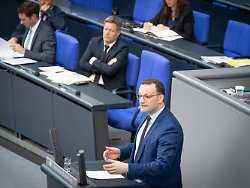Criticism of Habeck’s gas plan
Spahn: Citizens should not be asked to freeze
6/20/2022, 8:33 am
In view of the throttled gas supply from Russia, Germany is heading for a serious situation. Economics Minister Habeck demands that industry and citizens save energy wherever possible. The approach is too rash for CDU politician Spahn. He suggests letting nuclear power plants run longer.
Union parliamentary group leader Jens Spahn has criticized Economics Minister Robert Habeck’s (Greens) plans to cut gas consumption as too late and insufficient. “It’s true that Robert Habeck is taking this step, jumping over his shadow. Only – he’s taking it too late,” said the CDU politician in the ARD morning show. The federal government is obviously not well prepared. “If we had already started running more coal-fired power plants and fewer gas-fired power plants in March, the storage facilities would now be ten percent fuller.”
From Spahn’s point of view, Habeck only goes half the way because he no longer runs nuclear power plants. He does not understand that the green climate minister prefers coal-fired power plants to run longer and more than CO2-neutral nuclear power plants, said Spahn. With a view to resistance from operators of nuclear power plants in the face of high hurdles, the parliamentary group leader said in the Bundestag that energy suppliers were not happy because it meant additional effort. “But we are in a real emergency,” said Spahn. Before citizens are asked to freeze, politicians should examine all alternatives. “This also includes the longer running of nuclear power plants,” said Spahn. It’s not about questioning the exit.
Habeck wants to take additional measures to save gas and increase precaution. He described the situation as serious. To counteract this, the use of gas for power generation and industry is to be reduced, and more coal-fired power plants are to be used. They are intended to replace electricity generation by natural gas-fired power plants as far as possible in order to save natural gas. The filling of the gas storage is to be promoted in order to be prepared for the winter.
In order to save on a large scale, the President of the Federal Network Agency, Klaus Müller, also proposed lowering the heating requirements. Landlords should no longer have to turn up the heating system to at least 20 to 22 degrees during the heating period, but the specifications could drop at times. The Federal Association of German Housing and Real Estate Companies (GdW) called for the minimum temperature in the apartments to be reduced by up to 6 degrees in the event of a gas shortage. “Should gas deliveries to Germany be significantly restricted in the future and there should be a shortage, the legal framework should be adjusted so that further reductions in the minimum temperature to a maximum lower limit of 18 degrees during the day and 16 degrees at night are possible,” said GdW President Axel Gedaschko of the Funke media group.
